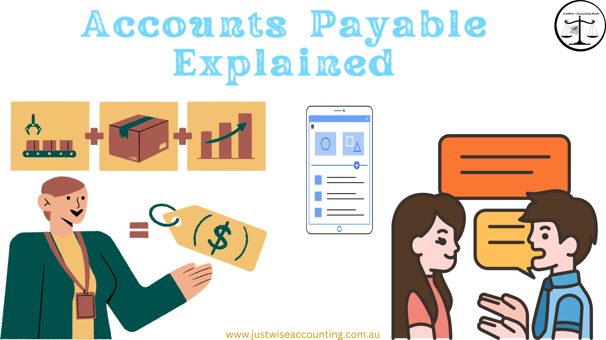What Does AP Stand for in Accounting? | Accounts Payable Explained
Learn what AP means in accounting, how accounts payable works in your business, and why managing it properly matters for cashflow.
Justwise Accounting
2 min read


What Does AP Stand for in Accounting? A Small Business Owner’s Guide to Payables
If you're reviewing your bookkeeping reports or using accounting software like Xero or MYOB, you've likely come across the abbreviation AP. But what does AP actually mean — and why should business owners pay attention to it?
In simple terms, AP stands for Accounts Payable.
It’s not just an accounting term. Understanding how accounts payable works is essential for managing your outgoings, protecting supplier relationships, and keeping your cashflow under control.
What Is Accounts Payable (AP)?
Accounts Payable (AP) refers to the money your business owes to suppliers, vendors, contractors, or service providers for goods or services you’ve already received — but not yet paid for.
Put another way:
AP represents short-term debts that need to be paid.
Common examples of accounts payable include:
Supplier invoices for stock or materials
Contractor invoices awaiting payment
Unpaid utility bills or subscriptions
Any expense that’s been invoiced but not settled yet
Why AP Matters for Business Owners
1. It Reflects Your Outstanding Expenses
Your AP balance shows what you owe right now. It’s a snapshot of your liabilities — important for understanding how much of your current bank balance is already spoken for.
2. It Affects Your Cashflow Forecast
If you have $50,000 in the bank but $30,000 in unpaid supplier invoices due next week, your real available cash is far lower than it seems.
Managing AP helps you plan ahead, avoid surprises, and ensure you don’t miss important payments.
3. It Impacts Business Credibility
Paying suppliers on time builds trust and reliability — which can lead to better pricing, flexible terms, and stronger relationships. Poor AP management, on the other hand, can damage your reputation or result in late fees.
How AP Works in Your Bookkeeping System
Most bookkeeping software will track AP automatically. Here’s how it typically flows:
A supplier sends you an invoice
You enter it into your system as a bill
It appears under “Accounts Payable”
When you pay the invoice, the balance reduces
Your profit/loss and cashflow statements update accordingly
At any time, you can run an AP ageing report to see:
Total payables
Invoices due soon
Overdue bills that need attention
AP vs AR: What’s the Difference?
It’s easy to confuse AP and AR — especially if you’re new to bookkeeping.
AP (Accounts Payable): Money you owe to others
AR (Accounts Receivable): Money others owe to you
Together, AP and AR form a major part of your working capital. Managing both sides effectively is key to business stability.
Tips for Managing AP Smoothly
Log invoices promptly so you don’t forget to pay
Set up reminders for due dates or use software alerts
Batch payments weekly to streamline your process
Negotiate terms if cash is tight (e.g., ask for 14–30 days)
Avoid paying too early if it disrupts your cash buffer
Managing AP is not just about keeping up — it’s about being strategic with your outgoings.
Final Thoughts
So, what does AP stand for in accounting? It stands for Accounts Payable — and it represents the bills and supplier invoices your business is responsible for paying.
It may seem like a background task, but how you manage AP has a direct impact on your business’s financial health, cashflow, and reputation.
Whether you’re handling payments yourself or working with a bookkeeper, make sure your AP processes are tight, timely, and transparent.
Need help reviewing your accounts payable setup or integrating it with your cashflow tools? Justwise Accounting can help you streamline your systems so you stay on top of every dollar going out — without the headaches.
Stay in Touch
© 2025 JustWise Accounting. All rights reserved. ABN 85 581 353 385
⚠️ We respect your privacy. Unsubscribe anytime. (under subscribe button)
Serving Australia-wide
Justwise acknowledge the Traditional Owners of the lands where we operate and pay respect to Elders past and present.
